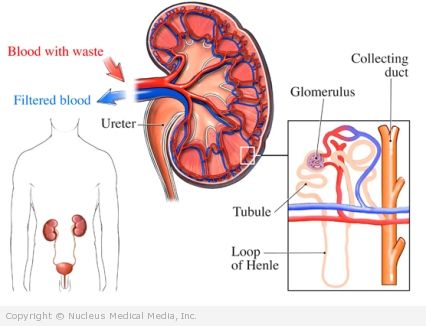(Infection, Kidney; Pyelonephritis)
Kidney infection – Definition
Kidney infections occur when there is a bacteria infection in one or both kidneys. The kidneys remove waste (in the form of urine) from the body. They also balance the water and mineral content in the blood.
Kidney infection – Causes
Kidney infection may be caused by:
- A bladder infection that was not treated or was inadequately treated (most common cause)
- Conditions that slow the flow of urine from the bladder, such as an enlarged prostate or kidney stones
- Having a cystoscopy done to examine the bladder
- Surgery of the urinary tract
- Use of a catheter to drain urine from the bladder
- Bacteria from somewhere else in the body that has gone into the kidneys (rare)
Kidney infection – Risk Factors
Factors that may increase your chance of a kidney infection include:
- Sex: female
- Sexual activity
- Pregnancy
- Diabetes
- Birth defect of the urinary tract, including vesicoureteral reflux
- Conditions that cause blockage of the urinary tract, including:
- Tumors
- Enlarged prostate gland
- Kidney stones
- Catheter or stent placed in the urinary tract
- Polycystic kidneys
- Sickle cell anemia
- Previous kidney transplant
- Weakened immune system
Kidney infection – Symptoms
Symptoms include:
- Pain in the abdomen, lower back, side, or groin
- Frequent urination
- Urgent urination that produces only a small amount of urine
- Sensation of a full bladder — even after urination
- Burning pain with urination
- Fever and chills
- Nausea and vomiting
- Pus and blood in the urine
- Loss of appetite
Kidney infection – Diagnosis
Your doctor will ask about your symptoms and medical history. A physical exam will be done. A kidney infection is diagnosed with urine tests. The urine is examined for:
- Bacteria or other signs of infection
- Blood
- Other abnormal elements
If the infection does not go away after treatment or if you have had several kidney infections, you may need to have other tests to see if there are problems with the kidney, ureters, and bladder. These tests include:
- Kidney ultrasound
- Abdominal CT scan
- An x-ray of the urinary bladder and urethra
Kidney infection – Treatment
You will be treated with antibiotics. Be sure to take all of the medication. If the infection is not treated correctly or is left untreated, kidney infection can lead to:
- Sepsis (infection that has spread throughout the body)
- Chronic infection
- Scarring of the kidney
- Permanent kidney damage
In some cases, you may need to stay in the hospital. Antibiotics may be given through an IV..
If you are diagnosed with a kidney infection, follow your doctor’s instructions.
Kidney infection – Prevention
Since kidney infection is often a complication of a bladder infection, you can prevent bladder infections if you:
- Drink plenty of fluids (about 8 to 10, 8-ounce glasses per day). Cranberry juice is a good choice to prevent bladder infection.
- Practice good hygiene.
- Urinate when you need to. Don’t wait.
- Take showers rather than baths.
- For women:
- Wipe from the front to the back after using the toilet.
- Urinate before and after sex. Drink water to help flush bacteria.
- Avoid genital deodorant sprays and douches.

